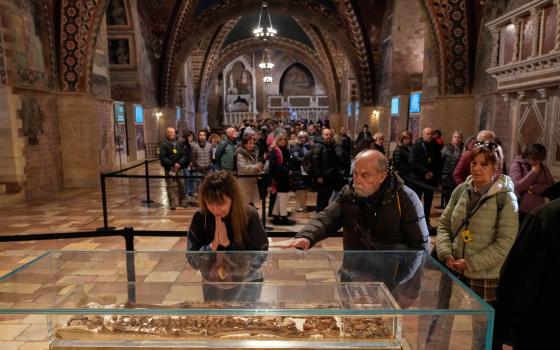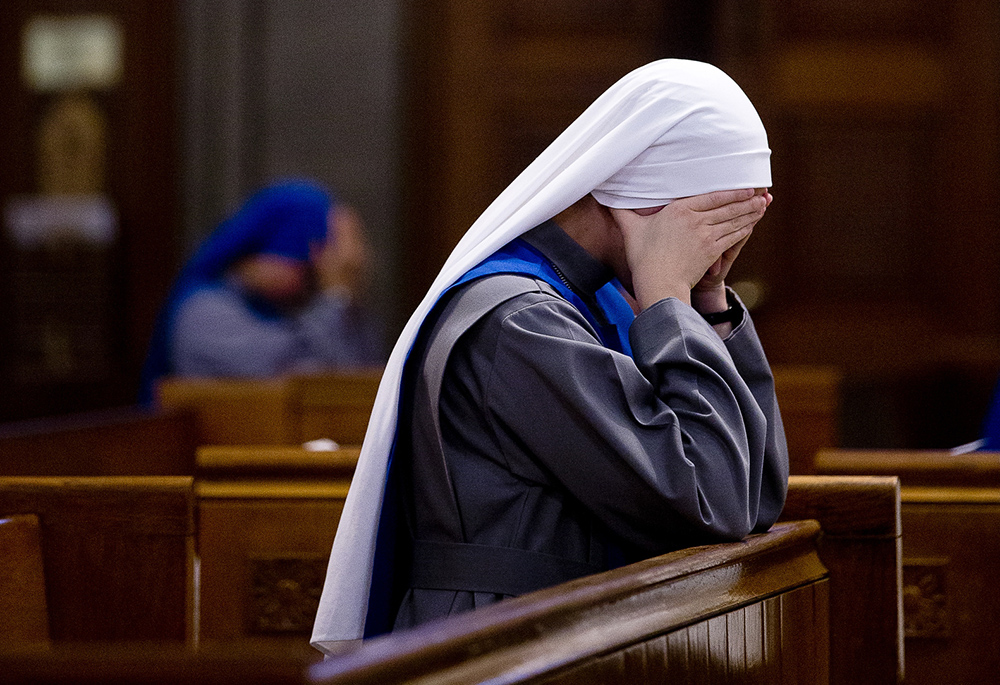
A novice prays prior to the start of her profession of vows in this 2017 file photo. (CNS/Tyler Orsburn)

The novitiate is the most intense time of formation in the life of a sister — a time of deep discernment, prayer, growth and transformation. It is also a place where one's personal faith and vocation are tested, lifelong bonds form, and the realities of religious life — its challenges and its beauty — begin to emerge, calling each woman to deeper authenticity.
This month, the panelists reflect on their early years of formation by responding to the prompt:
"When I entered the novitiate …"

Editruda Mbegu is a member of the Congregation of Our Lady Queen of Africa in Tanzania. Born and raised in Zimba, a small village near Lake Rukwa, she completed her primary education there. During secondary school, she won an essay competition and received recognition from the U.K. Embassy for her writing. She later earned a diploma and a bachelor's degree in education science from the University of Dar es Salaam and a master's degree in biology of conservation from the University of Nairobi, Kenya. A dedicated teacher and natural conservationist, she works as a teacher, counselor and caretaker.
When I entered the novitiate, my great joy of the first day as a novice quickly turned into tears!
Our novitiate was not far from other formation houses, so as aspirants or postulants, we saw how the novices strictly followed the timetable, kept the rules, worked and prayed. We also knew the novice mistress at that time. She was tall, strong, pious, unsociable, and very law-abiding. We were very afraid of her! Still, everyone wanted to enter the novitiate to become a nun. We also admired the novices and treated them with special respect as our superiors.
One day before entering the novitiate, the novice mistress came to the postulancy and explained a few rules of the novitiate. Among other things, she emphasized the importance of silence, meditation and openness to the life of a novice. We listened attentively and with great awe. Nobody raised a hand to ask a question — a sign that everybody understood the talk and we were ready to become good novices!
'When I entered the novitiate, my great joy of the first day as a novice quickly turned into tears!'
—Sr. Editruda Mbegu
The next evening, after vespers and eucharistic adoration, we were led to the novitiate in a solemn procession. As we entered the door of the chapel that separates the novitiate from other formation houses, the aspirants, postulants and their formators waved to us, marking the beginning of a great new stage of religious life. Some shed tears, but I did not. I was very happy.
At the novitiate, we were warmly welcomed by the novices and their mistress. After dinner, we went to the dormitory. The rule was simple: Wherever you found your luggage, that was your bedroom. Each room held two novices, and roommates were assigned by placing a second set of luggage in the room. Surprisingly, I found that my roommate from the postulancy was also my roommate again. She was a very good friend of mine, and we were very happy to be together again.
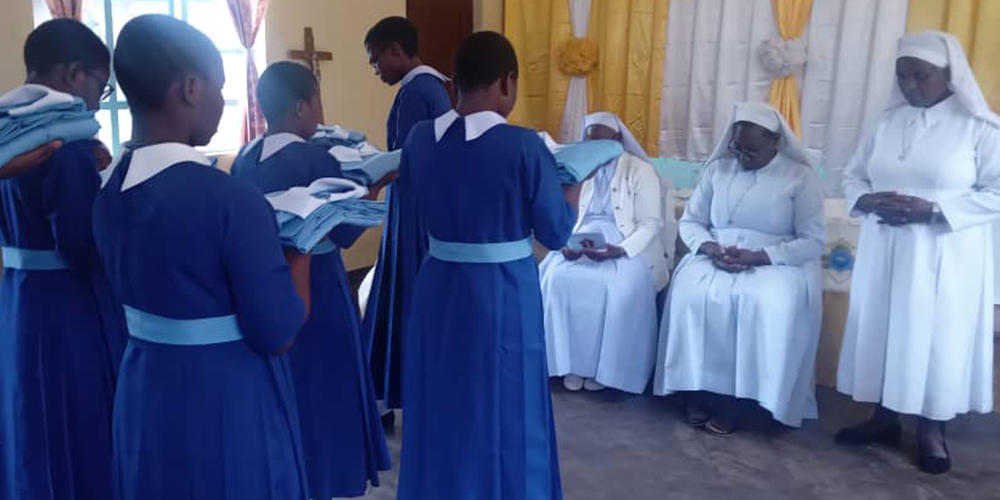
Postulants are pictured during the ceremony of entrance to the novitiate, at the novitiate house of the Sisters of Our Lady, Queen of Africa in Sumbawanga, Tanzania. (Courtesy of Editruda Mbegu)
After night prayers we went to bed. My roommate and I started whispering, telling stories and sharing news. But just a few minutes later, the door of the room suddenly opened. It was the novice mistress! She stood silently for a few minutes, staring at us sternly, and then asked, "Are you the novices who just entered today — talking at night in your bedroom? OK, we'll see tomorrow if you are worthy to be novices or not." Then she closed the door and went away!
I cried and trembled the whole night! That experience taught me a lesson I'll never forget: Many times, the difficulties and worries we face are often the consequences of our own actions or the burdens we carry within. That night began my journey to understand that formation wasn't just about rules — it was about being shaped, corrected and led to deeper self-awareness.

Ellen Dauwer is a Sister of Charity of St. Elizabeth of Convent Station, New Jersey, currently living in Chicago. She spent 20 years in higher education, teaching educational technology and serving in administration. She has served in congregational leadership and most recently served as executive director of the Religious Formation Conference for two terms. She is currently engaged in governance in several ministries and teaching, speaking and writing.
The morning I entered the novitiate I traveled in the "convent car" with several other sisters from my local community, with a reluctant heart and spirit. For the previous two years, I had lived with 15 sisters and ministered with them in an adjacent urban, multicultural K-12 girls' school. I was only three years out of college and full of enthusiasm for teaching junior high and being a part of both the local community and the larger congregation of the Sisters of Charity. I wasn't ready to step aside from it and enter a novitiate year.
My congregation's formation program called for a one-year canonical year. Our novitiate community consisted of six novices, a novice director, and two professed sisters who were engaged in nearby ministries. As products of the 1960s and early 1970s, we were inclined to question and challenge the status quo — to put it mildly! Needless to say, my reluctance to step aside from ministry and community was fueled in this conflictual atmosphere. I viewed novitiate as merely a means to an end.
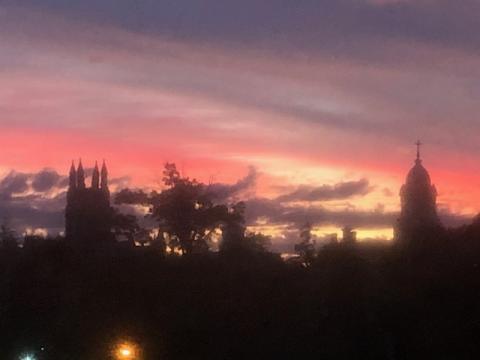
Sunrise of the Motherhouse chapel of the Sisters of Charity of St. Elizabeth of Convent Station, New Jersey (Ellen Dauwer)
At the midpoint of the year, we were given an opportunity to engage in a two-week ministry experience. I lived and worked with one of our sisters in senior apartments in Boston. I assisted in her social work ministry and eagerly accompanied her in jaunts throughout the city. She was non-defensive in answering my endless questions, and I learned and grew immensely from the experience.
Returning to the novitiate was harder than entering it. A week later I seriously debated leaving the novitiate. The internal struggle was between the immediate reality of initial formation and the larger picture of a clarion call to religious life. Unable to deny its reality, I threw my lot once again into "yes" and recommitted to the novitiate experience.
Converted by the struggle, I entered wholeheartedly into the rest of the year with a new weekly ministry experience, an extensive archives research project, and thorough preparation for vows. I read every book on the vow reading list! As the weather warmed and daylight lengthened, I took nightly walks that complemented my morning prayer time on our porch. Six months later I joyfully professed first vows and eagerly anticipated a new teaching ministry in Newark, New Jersey.
Looking back, I wonder if I was ready to enter the novitiate. Or was my reluctance fertile ground for conversion? Decades later when serving as executive director of the Religious Formation Conference, I chuckled at God's sense of humor. The one who bucked formation, at least in the beginning, was now professionally committed to it. It also provided me with an opportunity to reconcile and understand the journey of the early days.
'Decades later when serving as executive director of the Religious Formation Conference, I chuckled at God's sense of humor. The one who bucked formation, at least in the beginning, was now professionally committed to it.'
—Sr. Ellen Dauwer
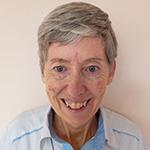
Nuala Doherty, a member of the Franciscan Missionaries of St. Joseph from the U.K., has spent the past 17 years serving as a parish sister in Ecuador, South America. Her ministry includes preparing catechists, leading eucharistic services and prayer groups, visiting the sick, and offering informal English lessons. Prior to her work in Ecuador, she served as a parish sister in the U.K. for two years and taught primary and secondary education in Kenya for three years. Through her diverse roles, she is dedicated to fostering faith and community wherever she is called.
When I entered the novitiate, I was a little wet behind the ears.
Although I entered the novitiate at the mature age of 39 — a late vocation — I was a little naive and not always sure of what was expected of me. My social hours weren't always in keeping with the community. For example, I didn't think there was anything amiss with visiting friends and strolling back into the convent at midnight. On reflection I did possibly socialize a little too much.
There is a famous story about the novice monk who used to spend a lot of time outside the monastery, much to the chagrin of his novice master. When asked why he did this, he replied, "It's the going out that keeps me in." I used to tell a friend of mine that I could relate to this monk.
Another faux pas was asking too many questions, one after the other, much to the annoyance of my novice director. It came to the point that she limited me to five questions a day. I made a few more blunders before the two years were out.
My novitiate took place in the beautiful, majestic and historic city of Canterbury. I was fortunate to have a bedroom overlooking the spire of the cathedral. I also considered it a privilege to study in the Franciscan Study Centre, where I met religious from all over the world and received excellent classes from some great lecturers. Step by step, I was learning the ropes and adapting to this new style of life.
'Another faux pas was asking too many questions, one after the other, much to the annoyance of my novice director. It came to the point that she limited me to five questions a day.'
—Sr. Nuala Doherty
The death of a core member of the L'Arche Community in Canterbury had somewhat of an effect on me. He was not able to talk but used to hum and rock rhythmically backwards and forwards. He was the gentlest of characters. His way of showing affection was to stroke you on the hand or the cheek. At his funeral they put aluminum bottle tops on a colorful piece of fabric covering his casket.
He was very much loved by all who came into contact with him. He taught me that it is not so much in what we do but more in who we are that endears us to others. The light of Christ certainly shone through him..
Now, 25 years later, I am very far from majestic Canterbury, based in a small rural part of Ecuador that has its own natural beauty — its native exotic flowers, trees and waterfalls. I think I am a little less naive and have learned to be more discreet, though still a curious creature. Adopting a more contemplative lifestyle lends itself to my spending more time in the house or working in the garden. One could say now that it's the staying in that gets me out.
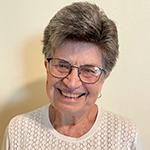
Pat Farrell, a native of Iowa and Franciscan Sister of Dubuque, holds a bachelor's degree in English and a master's in social work. Her early ministry included religious education and teaching in rural Iowa, followed by pastoral work and community organizing with the Hispanic community in San Antonio, Texas. Twenty-eight years in Latin America — first in Chile during the dictatorship, then in El Salvador's civil war, and later in Honduras — ignited her lifelong commitment to peacemaking, human rights, and trauma healing. She also provided psychotherapy to immigrant and refugee groups in Chicago and in Omaha, Nebraska. She served as president of the Leadership Conference of Women Religious from 2011 to 2013, a critical period during its Vatican assessment. Currently, she lives in Okolona, Mississippi, where she serves as spiritual director and does volunteer work.
I entered the Sisters of St. Francis of Dubuque, Iowa, in 1965. By 1966 I was a newly habited novice — earnest, idealistic, filled with 19-year-old energy, surrounded by a sizable number of equally lively peers. The Second Vatican Council had just concluded. It was the ecclesial air we breathed, the all-enveloping context of our formative years. We thoroughly studied every council document. It was inspiring, challenging and provocative. There was forward-moving impetus. Hope was in the air. We could imagine nothing else.
Meanwhile, a storm was brewing outside our convent walls: the Vietnam War, social and political upheaval, the sexual revolution, and growing pushback to change in both church and society. Such turmoil matched the inner world of novices. We were in the throes of self-discovery and identity crises, trying to find our adult sea legs. Many left religious life. Some of us stayed and have lived with continual change ever since.
The most immediate Vatican II changes we experienced were in the area of liturgy. I personally loved Gregorian chant and since high school years had always been part of a schola. The familiar feel of the heavy Liber Usualis in my hands was no burden to me. Yet I, too, traded that book of unique musical notation for a guitar, and learned many of the early, rather trite songs in English that made their way into liturgical celebrations. We reconfigured the space in our chapel, turned the altar around, and hauled an assortment of statues to the attic. And, of course, we were very pleased with ourselves, taken up in the enthusiasm of experimentation.
Advertisement
I lived all of this as a muddled young adult. I entered into a major faith crisis and didn't really know what I wanted to do with my life. The path ahead unfolded for me only gradually, guided by a genuine spiritual hunger and the grace of God. On the way, there was fun to be had in breaking some of the remaining rules. The motherhouse attic was the place where mischief hatched — often when we were to be keeping the nighttime solemn silence. For birthdays, some of those statues from the attic appeared in a novice's bed, or nearby, standing upright … and other pranks I shall not disclose because our imaginations ran wild! Youthful energy was not to be suppressed!
I look back on all of this now as long-past history. Those who entered religious life after me knew other contexts, challenges, events of greater significance to them. What remains for me is the energy and optimism of my early days in the congregation. I know what that is. It is nourished and renewed now with the spirit of Pope Francis, a synodal church, and the fresh hope of Pope Leo XIV.
What remains for me is the energy and optimism of my early days in the congregation. I know what that is. It is nourished and renewed now with the spirit of Pope Francis, a synodal church, and the fresh hope of Pope Leo XIV.
—Sr. Pat Farrell

Born in Myanmar, Stella Mary is a member of the Servite Congregation, which is committed to prayer and service. She was missioned to Australia to focus on supporting her home country financially and spiritually. Currently, she teaches science, math and religious education at a secondary school, shaping both the academic and spiritual lives of her students. Additionally, she serves as a support worker at a refuge for women affected by domestic violence, providing guidance and a safe space for rebuilding their lives. She also offers counseling services in prison ministry and the wider community, helping individuals navigate personal challenges and find healing through her diverse ministry.
Entering religious life was a turning point in my life — unexpected, unprepared, and deeply transformative. I came from a loving and protective family, and religious life was never part of my plan. But when universities in Myanmar closed indefinitely due to government unrest and student strikes, I was faced with a life-changing decision. In a culture where women often choose between marriage or religious life, I chose the latter, moved by a desire to serve those in need.
I entered religious life suddenly, without preparation. It was a time of intense struggle — physically, mentally and emotionally — as I tried to adapt to the structure of convent life. Yet, because of my desire and passion to embrace this new environment and the people around me, I gave my best effort to fit in — with the grace of God sustaining me.
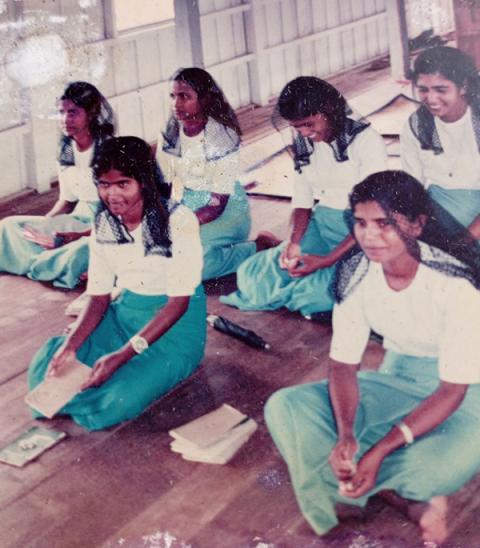
Sr. Stella Mary (third from left, back row) with her novitiate companions at the novitiate house of the Servite Sisters in Thanatpin, Myanmar, in 1994 (Courtesy of Stella Mary)
In the novitiate, I found a sacred rhythm: organized prayer, spiritual formation, deep connection with God, and the close guidance of our novice mistress. My most joyful moments were in prayer — whether in nature, adoration, silence, fasting, or retreat — where I felt God's presence most deeply.
Unexpectedly, the university reopened, and I had to juggle my novitiate life with academic study. Once again, through persistence, resilience and God's tremendous support, I got through that season as well.
There were also moments of struggle in the novitiate, like receiving anonymous feedback every month without dialogue or explanation, and the reconciliation ritual where I knelt, kissed the ground, and asked forgiveness from the community. Though difficult, these traditions shaped me profoundly.
Now serving in Australia as a teacher, chaplain, support worker, and counselor, I carry the lessons of that time with me. In moments of struggle, I would whisper, "Lord, make me good," and remember the words of Scripture (Romans 8:31): "If God is for us, who can be against us?"
'To those now entering the novitiate, thinking of choosing the religious path, or wondering which congregation to follow: Know that it is OK to struggle. Let the process shape you. Let prayer be your anchor.'
—Sr. Stella Mary
The Servite charism, rooted in compassion and the example of Our Lady of Sorrows, continues to guide my heart. I thank God for shaping me through every joy and trial. May he continue to mold me in his love, and may I always be a vessel of his mercy to those in need.
To those now entering the novitiate, thinking of choosing the religious path, or wondering which congregation to follow: Know that it is OK to struggle. Let the process shape you. Let prayer be your anchor. Whisper often, "Lord, make me good," and hold close the words of Scripture: "If God is for us, who can be against us?" You are being formed for something beautiful.
May you walk with courage into the unknown, trusting that God is already there, waiting to meet you.





